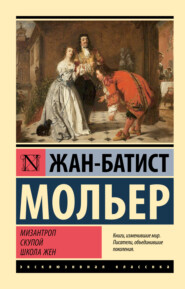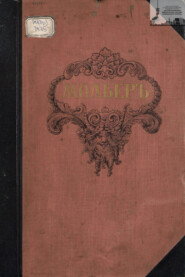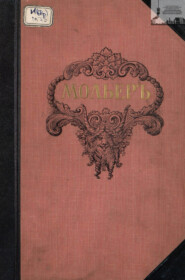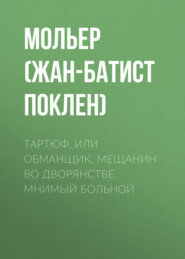По всем вопросам обращайтесь на: info@litportal.ru
(©) 2003-2024.
✖
Sganarelle, or, the Self-Deceived Husband
Год написания книги
2017
Настройки чтения
Размер шрифта
Высота строк
Поля
SGAN. What! is that all? You made such a noise, I thought the world was at an end. Let us see, however. Madam, are you dead? Um! she does not say one word.
MAID. I shall fetch somebody to carry her in; be kind enough to hold her so long.
SCENE IV. – CELIA, SGANARELLE, SGANARELLE'S WIFE
SGAN. (passing his hand over Celia's bosom). She is cold all over, and I do not know what to say to it. Let me draw a little nearer and try whether she breathes or not. Upon my word, I cannot tell, but I perceive still some signs of life.
SGAN.'S WIFE, (looking from the window). Ah! what do I see? My husband, holding in his arms… But I shall go down; he is false to me most certainly; I should be glad to catch him.
SGAN. She must be assisted very quickly; she would certainly be in the wrong to die. A journey to another world is very foolish, so long as a body is able to stay in this. (He carries her in).
SCENE V. – SGANARELLE'S WIFE, alone
He has suddenly left this spot; his flight has disappointed my curiosity; but I doubt no longer that he is unfaithful to me; the little I have seen sufficiently proves it. I am no longer astonished that he returns my modest love with strange coldness; the ungrateful wretch reserves his caresses for others, and starves me in order to feed their pleasures. This is the common way of husbands; they become indifferent to what is lawful; at the beginning they do wonders, and seem to be very much in love with us, but the wretches soon grow weary of our fondness, and carry elsewhere what is due to us alone. Oh! how it vexes me that the law will not permit us to change our husband as we do our linen! That would be very convenient; and, troth, I know some women whom it would please as much as myself. (Taking up the picture which Celia had let fall). But what a pretty thing has fortune sent me here; the enamel of it is most beautiful, the workmanship delightful; let me open it?
SCENE VI. – SGANARELLE, SGANARELLE'S WIFE
SGAN. (Thinking himself alone). They thought her dead, but it was nothing at all! She is already recovering and nearly well again. But I see my wife.
SGAN.'S WIFE. (Thinking herself alone). O Heaven! It is a miniature, a fine picture of a handsome man.
SGAN. (Aside, and looking over his wife's shoulder). What is this she looks at so closely? This picture bodes my honour little good. A very ugly feeling of jealousy begins to creep over me.
SGAN.'S WIFE. (Not seeing her husband). I never saw anything more beautiful in my life! The workmanship is even of greater value than the gold! Oh, how sweet it smells!
SGAN. (Aside). The deuce! She kisses it! I am victimized!
SGAN.'S WIFE. (Continues her Monologue.) I think it must be a charming thing to have such a fine-looking man for a sweetheart; if he should urge his suit very much the temptation would be great. Alas! why have I not a handsome man like this for my husband instead of my booby, my clod-hopper…?
SGAN. (Snatching the portrait from her). What, hussey! have I caught you in the very act, slandering your honourable and darling husband? According to you, most worthy spouse, and everything well considered, the husband is not as good as the wife? In Beelzebub's name (and may he fly away with you), what better match could you wish for? Is there any fault to be found with me? It seems that this shape, this air, which everybody admires; this face, so fit to inspire love, for which a thousand fair ones sigh both night and day; in a word, my own delightful self, by no manner of means pleases you. Moreover, to satisfy your ravenous appetite you add to the husband the relish of a gallant.
SGAN.'S WIFE. I see plainly the drift of your jocular remarks, though you do not clearly express yourself. You expect by these means…
SGAN. Try to impose upon others, not upon me, I pray you. The fact is evident; I have in my hands a convincing proof of the injury I complain of.
SGAN.'S WIFE. I am already too angry, and do not wish you to make me more so by any fresh insult. Hark ye, do not imagine that you shall keep this pretty thing; consider…
SGAN. I am seriously considering whether I shall break your neck. I wish I had but the original of this portrait in my power as much as I have the copy.
SGAN.'S WIFE. Why?
SGAN. For nothing at all, dear, sweet object of my love! I am very wrong to speak out; my forehead ought to thank you for many favours received. (Looking at the portrait of Lelio). There he is, your darling, the pretty bed-fellow, the wicked incentive of your secret flame, the merry blade with whom…
SGAN.'S WIFE. With whom? Go on.
SGAN. With whom, I say… I am almost bursting with vexation.
[Footnote: The original has: "j'en creve d'ennuis." The French word ennui, which now only means weariness of mind, signified formerly injury, and the vexation or hatred caused thereby; something like the English word "annoy," as in Shakespeare's Richard III., v. 3: "Sleep, Richmond, sleep in peace, and wake in joy; Good angels guard thee from the boar's annoy."]
SGAN.'S WIFE. What does the drunken sot mean by all this?
SGAN. You know but too well, Mrs. Impudence. No one will call me any longer Sganarelle, but every one will give me the title of Signor Cornutus; my honor is gone, but to reward you, who took it from me, I shall at the very least break you an arm or a couple of ribs.
SGAN.'S WIFE. How dare you talk to me thus?
SGAN. How dare you play me these devilish pranks?
SGAN.'S WIFE. What devilish pranks? Say what you mean.
SGAN. Oh! It is not worth complaining of. A stag's top-knot on my head is indeed a very pretty ornament for everybody to come and look at.
SGAN.'S WIFE. After you have insulted your wife so grossly as to excite her thirst for vengeance, you stupidly imagine you can prevent the effects of it by pretending to be angry? Such insolence was never before known on the like occasion. The offender is the person who begins the quarrel.
SGAN. Oh! what a shameless creature! To see the confident behaviour of this woman, would not any one suppose her to be very virtuous?
SGAN.'S WIFE. Away, go about your business, wheedle your mistresses, tell them you love them, caress them even, but give me back my picture, and do not make a jest of me. (She snatches the picture from him and runs away).
SGAN. So you think to escape me; but I shall get hold of it again in spite of you.
SCENE VII. – LELIO, GROS-RENÉ
GR. – RE. Here we are at last; but, sir, if I might be so bold, I should like you to tell me one thing.
LEL. Well, speak.
GR. – RE. Are you possessed by some devil or other, that you do not sink under such fatigues as these? For eight whole days we have been riding long stages, and have not been sparing of whip and spur to urge on confounded screws, whose cursed trot shook us so very much that, for my part, I feel as if every limb was out of joint; without mentioning a worse mishap which troubles me very much in a place I will not mention. And yet, no sooner are you at your journey's end, than you go out well and hearty, without taking rest, or eating the least morsel.
LEL. My haste may well be excused, for I am greatly alarmed about the report of Celia's marriage. You know I adore her, and, before everything, I wish to hear if there is any truth in this ominous rumour.
GR. – RE. Ay, sir, but a good meal would be of great use to you to discover the truth or falsehood of this report; doubtless you would become thereby much stronger to withstand the strokes of fate. I judge by my own self, for, when I am fasting, the smallest disappointment gets hold of me and pulls me down; but when I have eaten sufficiently my soul can resist anything, and the greatest misfortunes cannot depress it. Believe me, stuff yourself well, and do not be too cautious. To fortify you under whatever misfortune may do, and in order to prevent sorrow from entering your heart, let it float in plenty of wine.
[Footnote: This is an imitation of Plautus' Curculio, or the Forgery. The Parasite of Phæaedromus, who gave his name to the piece, says (ii. 3): – "I am quite undone. I can hardly see; my mouth is bitter; my teeth are blunted; my jaws are clammy through fasting; with my entrails thus lank with abstinence from food, am I come… Let's cram down something first; the gammon, the udder, and the kernels; these are the foundations for the stomach, with head and roast-beef, a good-sized cup and a capacious pot, that council enough may be forthcoming."]
LEL. I cannot eat.
GR. – RE. (Aside). I can eat very well indeed; If it is not true may I be struck dead! (Aloud). For all that, your dinner shall be ready presently.
LEL. Hold your tongue, I command you.
GR. – RE. How barbarous is that order!
LEL. I am not hungry, but uneasy.
GR. – RE. And I am hungry and uneasy as well, to see that a foolish love-affair engrosses all your thoughts.
[Footnote: Shakespeare, in The Two Gentlemen of Verona
(Act ii., Sc. I), has the following:

















